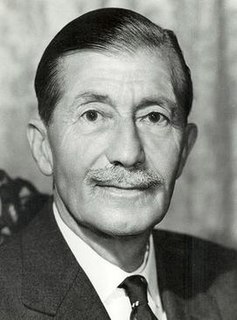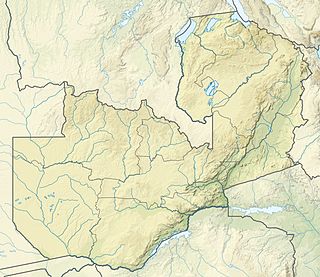
Rhodesia was a country in southern Africa from 1965 to 1979, equivalent in territory to modern Zimbabwe. Rhodesia was the de facto successor state to the British colony of Southern Rhodesia, which had been self-governing since achieving responsible government in 1923. A landlocked nation, Rhodesia was bordered by South Africa to the south, Bechuanaland to the southwest, Zambia to the northwest, and Mozambique to the east.

Sir Roland "Roy" Welensky, KCMG was a Northern Rhodesian politician and the second and last prime minister of the Federation of Rhodesia and Nyasaland.

Clifford Walter Dupont, GCLM, ID was a Rhodesian politician who served in the internationally unrecognised positions of Officer Administrating the Government and President. Born in London and qualifying as a solicitor, Dupont served during the Second World War as an officer of the British Royal Artillery in North Africa before first visiting Southern Rhodesia in 1947. He returned a year later, started a ranch and emigrated full-time during the early 1950s, by which time the country had become a territory of the Federation of Rhodesia and Nyasaland.

Winston Joseph Field CMG, MBE was a Rhodesian politician who served as the seventh Prime Minister of Southern Rhodesia. Field was a former Dominion Party MP who founded the Rhodesian Front political party with Ian Douglas Smith.

The Rhodesian Bush War—also called the Second Chimurenga and the Zimbabwe War of Liberation—was a civil conflict from July 1964 to December 1979 in the unrecognised country of Rhodesia . The conflict pitted three forces against one another: the Rhodesian government, led by Ian Smith ; the Zimbabwe African National Liberation Army, the military wing of Robert Mugabe's Zimbabwe African National Union; and the Zimbabwe People's Revolutionary Army of Joshua Nkomo's Zimbabwe African People's Union.

Sir Edgar Cuthbert Fremantle Whitehead,, OBE, was a Rhodesian politician. He was a longstanding member of the Southern Rhodesian Legislative Assembly, although his career was interrupted by other posts and by illness. In particular he had poor eyesight, and wore very thick glasses, and later suffered deafness whilst in office. As an ally of Sir Roy Welensky, he was Prime Minister of Southern Rhodesia from 1958 to 1962. His government was defeated in the 1962 general election by the Rhodesian Front.
Goffal or Goffels is a term applied to Coloureds, or persons of mixed race claiming both European and African descent, in Malawi, Zambia, and Zimbabwe. The community includes many diverse constituents of Shona, Northern Ndebele, Bemba, Chewa, British, Afrikaner, and occasionally Indian descent.
Harry Mwaanga Nkumbula was a Zambian nationalist leader involved in the movement for the independence of Northern Rhodesia, as Zambia was known until the end of British rule in 1964. He was born in the village of Maala in the Namwala district of Zambia's southern province. He was the youngest of three children and the only son.
Simon Mwansa Kapwepwe was the first vice-president of Zambia from 1967 to 1970.
The history of Rhodesia from 1965 to 1979 covers Rhodesia's time as a state unrecognised by the international community following the predominantly white minority government's Unilateral Declaration of Independence on 11 November 1965. Headed by Prime Minister Ian Smith, the Rhodesian Front remained in government until 1 June 1979, when the country was reconstituted as Zimbabwe Rhodesia.

Air Rhodesia Flight 825 was a scheduled passenger flight that was shot down by the Zimbabwe People's Revolutionary Army (ZIPRA) on 3 September 1978, during the Rhodesian Bush War. The aircraft involved, a Vickers Viscount named the Hunyani, was flying the last leg of Air Rhodesia's regular scheduled service from Victoria Falls to the capital Salisbury, via the resort town of Kariba.
Rugby union in Zambia is a minor but growing sport. The Zambia national rugby union team is currently ranked 73rd by World Rugby. The Zambia Rugby Football Union has 3,650 registered players and three formally organised clubs.

The Victoria Falls Conference took place on the 26th August 1975 aboard a South African Railways train halfway across the Victoria Falls Bridge on the border between the unrecognised state of Rhodesia and Zambia. It was the culmination of the "détente" policy introduced and championed by B. J. Vorster, the Prime Minister of South Africa, which was then under apartheid and was attempting to improve its relations with the Frontline States to Rhodesia's north, west and east by helping to produce a settlement in Rhodesia. The participants in the conference were a delegation led by the Rhodesian Prime Minister Ian Smith on behalf of his government, and a nationalist delegation attending under the banner of Abel Muzorewa's African National Council (UANC), which for this conference also incorporated delegates from the Zimbabwe African National Union (ZANU), the Zimbabwe African People's Union (ZAPU) and the Front for the Liberation of Zimbabwe (FROLIZI). Vorster and the Zambian President Kenneth Kaunda acted as mediators in the conference, which was held on the border in an attempt to provide a venue both sides would accept as neutral.

The constitutional history of Zimbabwe starts with the arrival of white people to what was dubbed Southern Rhodesia in the 1890s. The country was initially run by an administrator appointed by the British South Africa Company. The prime ministerial role was first created in October 1923, when the country achieved responsible government, with Sir Charles Coghlan as its first Premier. The third Premier, George Mitchell, renamed the post Prime Minister in 1933.
Daniel Munkombwe was a Zambian politician. He worked as a political organizer and administrator for the ANC in Northern Rhodesia before and after independence. He was elected to Parliament in 1973 and served for 19 years. In 2001, he was appointed Minister for the Southern Province by Levy Mwanawasa and continued in that and other government posts until 2015, having been subsequently appointed by Rupiah Banda and Michael Sata.
Sir Thomas Spurgeon Page CBE was a Northern Rhodesian politician who was a member of the Legislative Council and its first Speaker.
Robinson Mwaakwe Nabulyato was a Zambian politician. He served as a member of the Legislative Council of Northern Rhodesia between 1954 and 1958 and then Speaker of the National Assembly of Zambia from 1968 until 1988 and again from 1991 until 1998.













